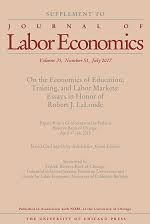
Bloemen, H. (2008). Job search, hours restrictions, and desired hours of work Journal of Labor Economics, 26(1):137--179.
-
Affiliated author
-
Publication year2008
-
JournalJournal of Labor Economics
A structural empirical job search model is presented that incorporates the labor supply decision of individuals. The arrival of a job offer is modeled as a random draw from a wage-hours offer distribution. Subjective information is used on desired working hours to identify optimal hours from offered hours. Policy simulations are performed to address several policy questions: Does a decrease in unemployment benefits lead to the acceptance of jobs with less preferred working hours? How does a decrease in the length of the standard working week affect the job acceptance behavior of the unemployed? {\textcopyright} 2008 by The University of Chicago. All rights reserved.